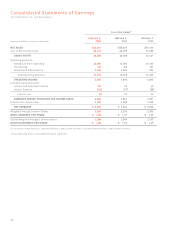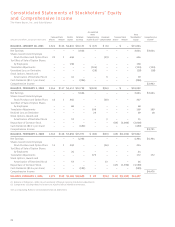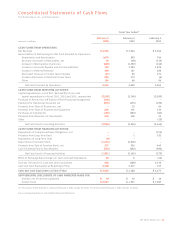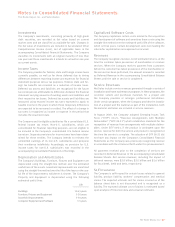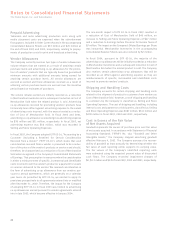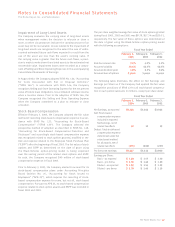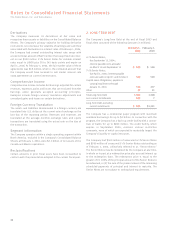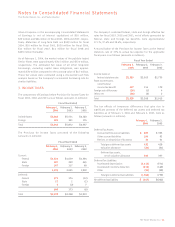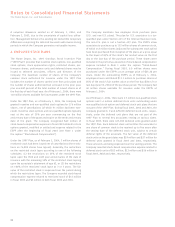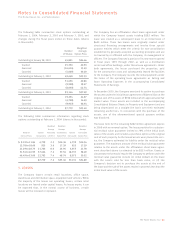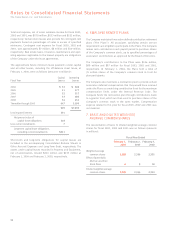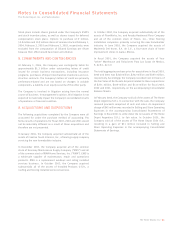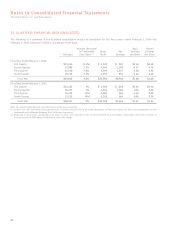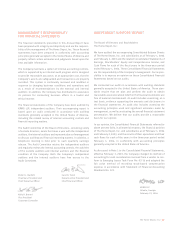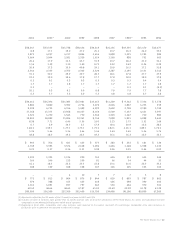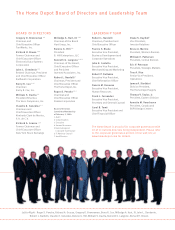Home Depot 2003 Annual Report Download - page 34
Download and view the complete annual report
Please find page 34 of the 2003 Home Depot annual report below. You can navigate through the pages in the report by either clicking on the pages listed below, or by using the keyword search tool below to find specific information within the annual report.A valuation allowance existed as of February 1, 2004, and
February 2, 2003, due to the uncertainty of capital loss utiliza-
tion. Management believes the existing net deductible temporary
differences comprising the deferred tax assets will reverse during
periods in which the Company generates net taxable income.
4. EMPLOYEE STOCK PLANS
The Home Depot, Inc. 1997 Omnibus Stock Incentive Plan
(“1997 Plan”) provides that incentive stock options, non-qualified
stock options, stock appreciation rights, restricted shares, per-
formance shares, performance units and deferred shares may be
issued to selected associates, officers and directors of the
Company. The maximum number of shares of the Company’s
common stock authorized for issuance under the 1997 Plan
includes the number of shares carried over from prior plans and
the number of shares authorized but unissued in the prior year,
plus one-half percent of the total number of issued shares as of
the first day of each fiscal year. As of February 1, 2004, there were
110 million shares available for future grants under the 1997 Plan.
Under the 1997 Plan, as of February 1, 2004, the Company had
granted incentive and non-qualified stock options for 176 million
shares, net of cancellations (of which 91 million had been exer-
cised). Incentive stock options and non-qualified options typically
vest at the rate of 25% per year commencing on the first
anniversary date of the grant and expire on the tenth anniversary
date of the grant. The Company recognized $40 million of
stock-based compensation expense in fiscal 2003 related to stock
options granted, modified or settled and expense related to the
ESPP after the beginning of fiscal 2003 (see Note 1under
the caption “Stock-Based Compensation”).
Under the 1997 Plan, as of February 1, 2004, 3million shares of
restricted stock had been issued net of cancellations (the restric-
tions on 76,800 shares have lapsed). Generally, the restrictions
on the restricted stock lapse according to one of the following
schedules: (1) the restrictions on 25% of the restricted stock
lapse upon the third and sixth year anniversaries of the date of
issuance with the remaining 50% of the restricted stock lapsing
upon the associate’s attainment of age 62, or (2) the restrictions
on 100% of the restricted stock lapse at 3or 5years. The fair
value of the restricted stock is expensed over the period during
which the restrictions lapse. The Company recorded stock-based
compensation expense related to restricted stock of $13 million
in fiscal 2003 and $3million in both fiscal 2002 and 2001.
The Company maintains two employee stock purchase plans
(U.S. and non-U.S. plans). The plan for U.S. associates is a tax-
qualified plan under Section 423 of the Internal Revenue Code.
The non-U.S. plan is not a Section 423 plan. The ESPPs allow
associates to purchase up to 152 million shares of common stock,
of which 112 million shares (adjusted for subsequent stock splits)
have been purchased from inception of the plans, at a price equal
to the lower of 85% of the stock’s fair market value on the first
day or the last day of the purchase period. These shares were
included in the pro forma calculation of stock-based compensation
expense included in Note 1 under the caption “Stock-Based
Compensation.” During fiscal 2003, 6.0 million shares were
purchased under the ESPPs at an average price of $25.28 per
share. Under the outstanding ESPPs as of February 1, 2004,
employees have contributed $11.1 million to purchase shares at
85% of the stock’s fair market value on the first day ($30.17) or
last day (June 30, 2004) of the purchase period. The Company had
40 million shares available for issuance under the ESPPs at
February 1, 2004.
As of February 1, 2004, there were 2.5 million non-qualified stock
options and 1.4 million deferred stock units outstanding under
non-qualified stock option and deferred stock unit plans that are
not part of the 1997 Plan. During fiscal 2003, 2002 and 2001, the
Company granted 0, 0and 629,000 deferred stock units, respec-
tively, under the deferred unit plans that are not part of the
1997 Plan to several key associates vesting at various dates.
In fiscal 2003, there were 635,000 deferred units granted under
the 1997 Plan. Each deferred stock unit entitles the associate to
one share of common stock to be received up to five years after
the vesting date of the deferred stock unit, subject to certain
deferral rights of the associate. The fair value of the deferred
stock units on the grant dates was $19 million and $27 million for
deferred units granted in fiscal 2003 and 2001, respectively.
These amounts are being expensed over the vesting periods. The
Company recorded stock-based compensation expense related to
deferred stock units of $13 million, $12 million and $16 million in
fiscal 2003, 2002 and 2001, respectively.
Notes to Consolidated Financial Statements
The Home Depot, Inc. and Subsidiaries
32


